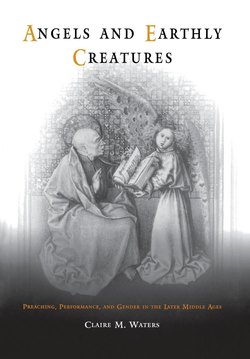Angels and Earthly Creatures

Реклама. ООО «ЛитРес», ИНН: 7719571260.
Оглавление
Claire M. Waters. Angels and Earthly Creatures
Отрывок из книги
Angels and Earthly Creatures
Ruth Mazo Karras, Series Editor
.....
The male preacher’s nonownership of his speech, then, both linked him to and distinguished him from a woman prophet because his depersonalized speech, unlike hers, paradoxically gave him ownership of his status as preacher. From this position, though his doctrine might be God’s, he could still refer to “my preaching” and claim both his own speech and its scriptural origins in a way that a woman—limited, at best, to reading, reciting, or exhorting—never could. Moreover, institutional sanction and descent from Christ made it possible for the male preacher’s body to disappear, in a sense, into that which it represented. The female body, much more marked as bodily in medieval culture, could not stage such a disappearance, and this cultural visibility made it extremely difficult for women to preach in the Middle Ages.71 It also helps to make medieval attitudes visible now, to access the problems with the human male bodies that late medieval theorists often obscured by assimilating those bodies into an idealized image of the preacher that emphasized office over person.
This, then, is what Aquinas’s discussion does not address: the great equalizer between male and female preachers, their humanness. He prefers simply to ignore or condemn the possibility of a human preacher’s mixed motives or his inadequacy to his role, and this precludes any serious consideration of the preacher’s self (se). Such complex questions, however, are precisely the strength of the preaching manuals. As these texts demonstrate, concerns such as ownership of speech, the place of the physical body in the act of preaching, and the preacher’s relationship to both an ultimate source of authority in God and the earthly authorization provided by the institutional church arose not just in relation to women but as fundamentally important matters for all preachers. The attempts at definition, like Aquinas’s exegesis, show the fragility of the preacher’s claim on the doctrine he conveyed and the fragility of the boundaries of preaching. Lying between the purely charismatic speech of prophecy (the ultimate expression of personal authority) and the purely sacramental speech of priesthood (the ultimate form of official authorization), preaching was a hybrid form. The preacher’s speech, and ownership of it, are at issue in ways that the prophet’s and the priest’s are not, and those questions of ownership make the speaking body peculiarly important.
.....